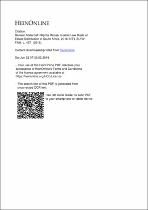| dc.contributor.author | Abduroaf, Muneer | |
| dc.contributor.author | Moosa, Najma | |
| dc.date.accessioned | 2022-10-05T09:00:54Z | |
| dc.date.available | 2022-10-05T09:00:54Z | |
| dc.date.issued | 2016 | |
| dc.identifier.citation | Abduroaf, M and Moosa, N. (2016) “Islamic mode of estate distribution in South Africa” in Atkin, B and Banda, F. (eds) Jordan Publishing NexisLexis, The International Survey of Family Law, 457-478. | en_US |
| dc.identifier.isbn | 13:978-1784732172 | |
| dc.identifier.uri | http://hdl.handle.net/10566/8012 | |
| dc.description.abstract | It has been argued by some academics that the Islamic law of intestate succession discriminates against females due to its unequal distribution of shares in favour of males.' The general example used in this regard is when a son inherits double the share of a daughter. The question as to whether the unequal distribution is consistent throughout the Islamic law of intestate succession is an important one and is further investigated herein. This chapter examines the mode of distribution of deceased estates in terms of Islamic law as currently applied in South Africa. Estate liability claims are first looked at by way of introduction. The law of testate succession is thereafter looked at with a focus on the limitations placed on freedom of testation. The law of intestate succession is then investigated with a specific focus on the position of females. The findings of this chapter are briefly examined and concluding remarks are then made. | en_US |
| dc.language.iso | en | en_US |
| dc.publisher | Jordan Publishing LexisNexis | en_US |
| dc.relation.ispartofseries | The International Survey of Family Law; | |
| dc.subject | Islamic Law | en_US |
| dc.subject | Islamic Law in South Africa | en_US |
| dc.subject | Intestate Succession | en_US |
| dc.subject | Testate Succession | en_US |
| dc.subject | Unequal distribution | en_US |
| dc.title | Islamic mode of estate distribution in South Africa | en_US |
| dc.type | Book chapter | en_US |

